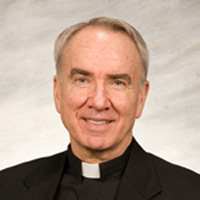
Even as the world economy struggles to recover from recession and the sub-prime mortgage crisis, the United Nations Global Compact Leaders Summit 2010 issued a challenge to corporate leaders to place a central focus on sustainability as they plan operations in the next decade.
Several representatives from the Mendoza College of Business at the University of Notre Dame participated in the summit, which took place June 24 and 25 in New York City. They included Carolyn Y. Woo, the Martin J. Gillen Dean of the Mendoza College; and Rev. Oliver F. Williams, C.S.C., an associate professor and director of the Notre Dame Center for Ethics and Religious Values in Business in the Mendoza College.
“Moving toward a world that is prosperous and peaceful for the present generation, as well as one that holds just as much promise for future generations, is the goal of sustainable development,” said Father Williams, who served as a discussion leader for the conference and as a member of the Foundation of the Global Compact Board of Directors. “The U.N. Global Compact principles, which focus on the universal ideals of human rights, labor issues, environmental and anti-corruption concerns, ask a business to be ethical as well as profitable. This has been the vision of the Mendoza College of Business since it was founded 90 years ago and so the U.N. Global Compact is a natural partner.”
Father Williams added that given the growing disparity between the rich and the poor throughout the world, the time is right for business to do more in advancing the U.N. Millennium Development Goals (MDGs) in overcoming poverty on the planet. Father Williams specializes in understanding how the ethics of virtue might inform the conduct of managers, and is the editor or author of 13 books as well as numerous articles on business ethics.
U.N. Secretary-General Ban Ki-moon opened the 2010 summit by urging more than 1,200 top business executives to usher in a new era of sustainability in which corporations played a central role.
“We need business as our partner more than ever,” the secretary-general said, stressing that no other corporate responsibility initiative was as global or inclusive as the United Nations Global Compact, which this year was marking its 10-year anniversary. With nearly 6,000 companies participating in more than 130 countries, the Compact asks businesses to integrate 10 core principles into their operations in the areas of human rights, labor standards, the environment and anti-corruption.
Ban commented further that the vision underpinning the Global Compact – that profits and principles go hand in hand – was more important than increasing the number of participants. He also pressed governments to do their part through transparency and smart regulation, which are the building blocks that would allow business activity to generate the benefits everyone knew were possible.
The summit also launched the Blueprint for Corporate Sustainability Leadership, a document that sets the course for the Global Compact’s next decade. The goal is to have 20,000 participants by 2020. At the same time, the United Nations is seeking to maintain the integrity of the initiative by monitoring whether the signatories do in fact adhere to the core principles. For instance, more than 1,300 companies have been dropped from the Compact for failing to report their progress in implementing the principles in the last two years.
“The Blueprint does not include any new requirements for U.N. Global Compact companies, but rather expands the vision,” said Father Williams. “It offers companies new ways to incorporate the 10 principles into their corporate culture and suggests additional opportunities to advance UN goals as the Millennium Development Goals.” Further, the blueprint suggests that NGOs and other non-business organizations may want to reward companies who have demonstrated outstanding performance by honoring them and enhancing their reputation, he added.
Dean Woo also participated in the summer as a member of a plenary panel that presented a landmark sustainability survey. ‘’A New Era of Sustainability: U.N. Global Compact-Accenture CEO Study 2010’’ surveyed more than 1,000 CEOs about how they view sustainability issues in relation to their core operations.
The results showed a distinct shift in mindset in recent years, with 93 percent of the participants responding that sustainability would be essential to their companies’ future success. Seventy-two percent of the CEOs cited “brand, trust and reputation” as among the top three factors driving them to take action on sustainability issues, while 58 percent had identified consumers as the most important stakeholder group that would impact how they managed societal expectations.
“It’s important that we begin to view sustainability and other ethical issues not just in terms of morality, but how to truly bring the power of business to bear on the issues impacting the human community,” Woo said. “To accomplish that, we must monitor and measure these efforts. The survey will be an important tool to gauge where we are, and where we need to go from here.”
The future work of the U.N. Global Compact will take place on a number of fronts.
“One major effort will be to expand and enhance the local networks, those groups of companies in a country or a locality that work on common problems,” said Father Williams, who will spend July in Seoul, South Korea, teaching about the Global Compact and learning how its local networks operate in Asia.